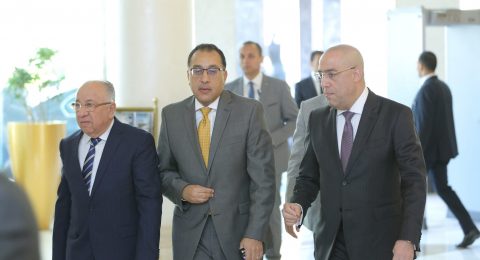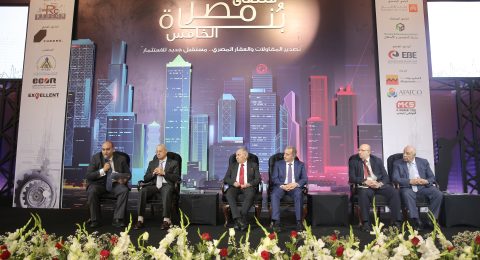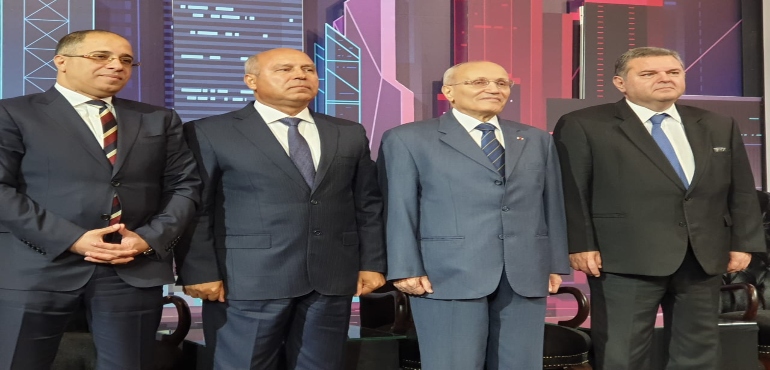Prime Minister Mostafa Madbouly inaugurated on June 16 the fifth edition of Builders of Egypt forum, under the rubric “Exporting Egypt’s Real Estate and Contracting Services: A New Future of Investments,” with more than 500 local, Arab, and African high-profile officials and business executives taking part to achieve integration among the continent’s nations, Invest-Gate reports.
With the participation of senior executives representing the construction, real estate development,  banking, and energy industries, the one-day event was jointly organized by the Egyptian Federation Construction and Building Contractors (EFCBC) and Export Council of Real Estate Investment (ECOR), held under the auspices of President Abdel-Fattah El-Sisi at Almasa Hotel, east Cairo.
banking, and energy industries, the one-day event was jointly organized by the Egyptian Federation Construction and Building Contractors (EFCBC) and Export Council of Real Estate Investment (ECOR), held under the auspices of President Abdel-Fattah El-Sisi at Almasa Hotel, east Cairo.
For the first time, 14 chairmen of Arab and African construction federations partake in the annual conference, in light of El-Sisi’s chairmanship of the African Union (AU) in early 2019, coming alongside the participation of Minister of Housing, Utilities, and Urban Communities Assem El Gazzar, Military Production Minister Mohamed El Assar, Minister of Public Enterprises Sector Hisham Tawfik, and Transport Minister Kamel El Wazir.
During his opening speech, CEO of Rooya Group and ECOR’s Chairman Hisham Shoukri stated, “Total real estate exports worldwide is estimated at USD 300 bn per year. Egypt’s share, however, does not exceed USD 400-500 mn annually,” pointing out that the average annual increase in property value in Egypt is the highest among MENA and Africa regions, representing 30% annually. Besides, the rental yield, especially within the administrative and commercial sectors, stands at over 13% – the highest among the competing countries.
However, since the various inputs of Egyptian land, labor, and local building materials are characterized by high value-added, exceeding 90%, higher exports of building materials, engineering, and construction services are being frequently witnessed across the board, Shourki elaborated.
high value-added, exceeding 90%, higher exports of building materials, engineering, and construction services are being frequently witnessed across the board, Shourki elaborated.
Member of ECOR and City Edge Developments’ CEO Amr El Kady suggested the allocation of a fixed budget by the state – to be supervised by the council, similar to the Egyptian Tourism PromotionAuthority’s case, for developers to conduct potent marketing campaigns and foster their products aboard, he noted during a speaker session, moderated by JLL Head of Egypt Office Ayman Sami, along with Tatweer Misr’s Managing Director and Board Member Ahmed Shalaby, CEO of Tabarak Holding Ali Shorbani, Head of Real Estate Development Chamber Tarek Shoukri, and Rooya’s Shoukri, where the latter called on the government to look for a specialized international firm to create a system for marketing and promoting real estate abroad, disseminating the right information to foreign investors, and directing them to the competent authorities in Egypt.
According to the chairman, without this stride, the state’s aspirations of raising real estate exports will not exceed the barrier of goodwill and will not even be close to reality, referring to another issue facing developers which is that any legal matter encountered when exporting property will not only be seen as an individual case, but will also impact the international image of all Egyptian companies in general. Thus, it is important to amend the executive regulations of housing registration to provide a seamless and hassle-free process.
Shourki went on to emphasize the third issue, with regards to the Egyptian real estate sector, which is the production of products that are not suitable for export, whether or not adapted to the tastes and demands of external investors. Therefore, there must be a study on the target markets as well as their needs to produce products to fit them. He urged the state to look out for marketing operations of the country’s educational, medical, and administrative fields, especially that an investor is looking for what contributes to the achievement of revenues of 7-8%, while Egyptian properties promise revenues surpassing 12%. Hence, it is necessary to demonstrate the real figures related to such sectors.
On another note, during the first panel, which was moderated by Tatweer Misr’s Shalaby, alongside El Assar and Tawfik as speakers, El Wazir stressed that all procedures and mechanisms for attracting investors to the Egyptian real estate sector, including industrial zones, the construction of dry ports and logistics areas, and developing mega road projects, are put into practice, which essentially plays a pivotal role in linking other countries and cities with developments across the nation.
 Similarly, Assistant Chairman of Holding Company for Construction and Development Mohamed Shoaib said there are several main axes to boost the expansion of real estate companies externally, led by the need to develop large entities and conglomerates with international rankings in order to increase these firms’ share among global competitions.
Similarly, Assistant Chairman of Holding Company for Construction and Development Mohamed Shoaib said there are several main axes to boost the expansion of real estate companies externally, led by the need to develop large entities and conglomerates with international rankings in order to increase these firms’ share among global competitions.
Furthermore, the rehabilitation of construction and real estate development companies, in terms of management, employment, and training, is necessary to keep pace with external expansion target, Shoaib explained, referring Beheria’s training center, which was established to coach nearly 17 professions to raise the competition of general contracting companies, amounting to roughly nine companies under the umbrella of Holding Company for Construction and Development.
In this regard, Chairman of Foreign Relations Committee at EFCBC Ahmed Afifi underlined that there is room for investment in regional states, highlighting that there are 40 Egypt-based contractors and companies engaged in the construction sector willing to expand abroad, particularly into Africa. He added that almost all African countries are generally in need of road infrastructure and electricity grids, with around 70% of citizens lacking sources of electricity generation.
On an industrial level, Malagasy textile industry, for example, is in great need for construction support, Afifi indicated, adding that several cooperation agreements have been signed with Tanzania for the export of cement in large quantities. He stressed on the need to significantly provide financial incentives and facilities to the construction sector, as it secures substantial support for all Egyptian exports, which will later be translated into positive impacts on the country’s tourism sector and the provision of foreign currency.
Besides, the chairman demanded the expansion of Egyptian banks’ representation offices and branches into East African countries, especially due to difficulties faced by companies and contractors when concluding any financial transaction.
Aiming to fulfill Egypt’s impending need for constructing a large and proper infrastructure in all different aspects, while displaying available opportunities for developers in African and Arab countries, Builders of Egypt is one of Egypt’s largest and most important events in the construction industry. The annual event is held under state support, with a view of improving the investment environment in the real estate field and comprehensive development and consolidating public-private partnerships in the MENA region.
